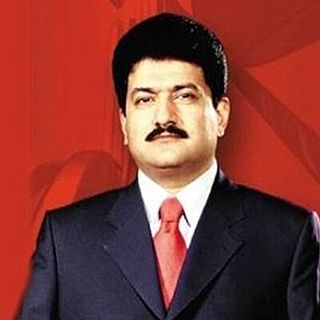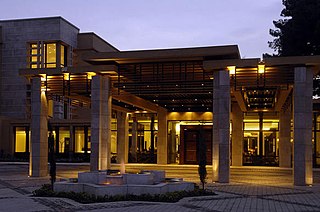This article includes a list of references, related reading or external links, but its sources remain unclear because it lacks inline citations .(September 2022) |
This is a list of the journalists killed in Pakistan:
This article includes a list of references, related reading or external links, but its sources remain unclear because it lacks inline citations .(September 2022) |
This is a list of the journalists killed in Pakistan:

A journalist is an individual that collects/gathers information in form of text, audio, or pictures, processes them into a news-worthy form, and disseminates it to the public. The act or process mainly done by the journalist is called journalism.

Daniel Pearl was an American journalist who worked for The Wall Street Journal. He was kidnapped and later decapitated by terrorists in Pakistan.

Hamid Mir is a Pakistani journalist, columnist and writer. Born in Lahore to a journalistic family, Mir initially worked as a journalist with Pakistani newspapers. He has hosted the political talk show Capital Talk on Geo News intermittently since 2002. He writes columns for Urdu as well as English newspapers, both national and international. He has been a contributor to the Global Opinions section of The Washington Post since June 2021. He is well-known for his stance against the dominance of the Establishment in Pakistan. Hamid Mir has survived two assassination attempts, has been banned from television three times, and has lost his job twice due to his stand for press freedom and human rights.

The situation of Human Rights in Pakistan is complex as a result of the country's diversity, large population, its status as a developing country and a sovereign Islamic democracy with a mixture of both Islamic and secular law. The Constitution of Pakistan provides for fundamental rights. The Clauses also provide for an independent Supreme Court, separation of executive and judiciary, an independent judiciary, independent Human Rights commission and freedom of movement within the country and abroad. However these clauses are not respected in practice.

The Insurgency in Balochistan is an insurgency or revolt by Baloch nationalists against the governments of Pakistan and Iran in the Balochistan region, which covers the Balochistan Province in southwestern Pakistan, Sistan and Baluchestan Province in southeastern Iran, and the Balochistan region of southern Afghanistan. Rich in natural resources like natural gas, oil, coal, copper, sulphur, fluoride and gold, this is the largest and least developed province in Pakistan. Armed groups demand greater control of the province's natural resources and political autonomy. Baloch separatists have attacked civilians from other ethnicities throughout the province. In the 2010s, attacks against the Shi'a community by sectarian groups—though not always directly related to the political struggle—have risen, contributing to tensions in Balochistan.
The Pakistani Constitution limits Censorship in Pakistan, but allows "reasonable restrictions in the interests of the sovereignty and integrity of Pakistan or public order or morality". Press freedom in Pakistan is limited by official censorship that restricts critical reporting and by the high level of violence against journalists. The armed forces, the judiciary, and religion are topics that frequently attract the government's attention.

In 1971, the Pakistan Army and their local collaborators, most notably the extreme right wing militia group Al-Badr, engaged in the systematic execution of Bengali intellectuals during the Bangladesh Liberation War of 1971. Bengali intellectuals were abducted, tortured and killed during the entire duration of the war as part of the 1971 Bangladesh genocide. However, the largest number of systematic executions took place on 25 March and 14 December 1971, two dates that bookend the conflict. 14 December is commemorated in Bangladesh as Martyred Intellectuals Day.
The Balochistan Liberation Front is a militant group operating in the Balochistan region of southwestern Asia. The group was founded by Jumma Khan in 1964 in Damascus, and played an important role in the 1968–1973 insurgency in Sistan and Baluchestan province of Iran and 1973–1977 insurgency in Balochistan province of Pakistan. However, the group's insurgency was defeated in both Pakistan and Iran and the status of the group became unknown until 2004. The group re-emerged in 2004 after Allah Nazar Baloch took command of the group in 2003. Since then the group has taken responsibility for attacks on civilians, journalists, government officials and military personnel.
Abu Hamza Rabia was an Egyptian member of al-Qaeda, described in news accounts as a high-ranking leader within the organization's hierarchy. His death in a surprise CIA drone attack was widely reported by media outlets around the world.

The 2008 Mumbai attacks were a series of terrorist attacks that took place in November 2008, when 10 members of Lashkar-e-Taiba, an Islamist terrorist organisation from Pakistan, carried out 12 coordinated shooting and bombing attacks lasting four days across Mumbai. The attacks, which drew widespread global condemnation, began on Wednesday 26 November and lasted until Saturday 29 November 2008. A total of 175 people died, including nine attackers, and more than 300 were wounded.

Samaa TV is a Pakistani Urdu language news channel owned by Aleem Khan. It is the fourth-largest news channel in Pakistan with a market share of 7 percent.
The June 2011 Peshawar bombings occurred on 12 June 2011 in Peshawar, Khyber Pakhtunkhwa, Pakistan. At least 34 people were killed, and more than 90 were injured, when two bombs exploded in a market around midnight. The first bomb went off around 11:50 p.m. local time in Khyber market area, which is a commercial and residential area, and injured 3 people. After a crowd gathered in the area, a teen-aged suicide bomber on a motorcycle set off a second explosion, killing many people on the spot. About 10 kilograms (22 lb) of explosives were used in the second blast according to officials. Police and rescue teams soon reached the spot and cordoned the area.
Abdost Rind , a reporter in Pakistan, was working for the Daily Eagle, an Urdu-language newspaper in the Turbat area of Balochistan, Pakistan, on 18 February, when he became the second journalist killed in Balochistan in 2011.
This is a list of terrorist incidents in Pakistan in 2004.

Martyred Intellectuals Day is observed on 14 December in Bangladesh to commemorate those intellectuals who were killed by Pakistani forces and their collaborators during the Bangladesh Liberation War, particularly on 25 March and 14 December 1971. The killings were undertaken with the goal of annihilating the intellectual class of what was then East Pakistan. Two days after the events of 14 December, on 16 December, Bangladesh became independent through the surrender of Pakistani forces.

Human rights violations in the province ofBalochistan refers to the human rights abuses that are occurring in the ongoing insurgency in Balochistan. The situation in has drawn concern in the international community, The human rights situation in Balochistan is credited to the long-running conflict between Baloch nationalists and Pakistani security forces.
Razzaq Gul was a senior Pakistani journalist covering war and politics for Express News in Turbat, Pakistan who was abducted 18 May 2012 and found murdered 19 May 2012. According to the Committee to Protect Journalists, Razzaq Gul was a member of the Baloch National Movement and secretary of the Press Club of Turbat. Gul was a member of the Baluch National Movement, a nationalist political organization, and was the secretary of the Press Club of Turbat, according to news reports. His colleagues at the club told Express News TV that Gul had not mentioned receiving any threats. No group claimed responsibility for his death.
On 10 January 2013, several bombings took place in the southwestern Pakistani city of Quetta, the capital of Balochistan, killing a total of 130 people and injuring at least 270. The Quetta bombings led to protests by the city's Shia Muslim Hazara community; Prime Minister of Pakistan Raja Pervez Ashraf responded by dismissing the Chief Minister of Balochistan, Aslam Raisani, and replacing him with Zulfikar Ali Magsi. On the same day, a bomb exploded in Swat District, Khyber Pakhtunkhwa, killing 22 people and injuring 60 others.
This is a list of lists of journalists.

On 20 March 2014, Taliban militants carried out a mass shooting in the restaurant of the Kabul Serena Hotel, in Kabul, Afghanistan. The shooting, which took place in a hotel popular with foreigners and wealthy Afghans, killed nine civilians, including five foreigners. The attack was a shock to many as it took place in a heavily fortified area of Kabul.